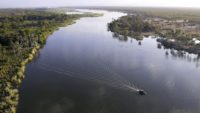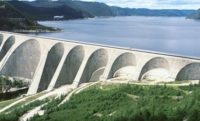A consortium of international energy and engineering firms has been picked as preferred developer of a $4.5-billion run-of-river hydropower project in Mozambique.
French firms TotalEnergies and Électricité de France S.A (EDF) as well as Japan’s Sumitomo Corp. will construct the 1,500-MW hydropower facility on the 2,574-km Zambezi River system, Africa fourth longest river after the Nile, Congo, and Niger rivers.
EDF, the lead member of the consortium will contribute 40% to the project’s development while TotalEnergies and Sumitomo will contribute 30% each to develop the power plant to be sited 60 km downstream from Cahora Bassa dam, Africa’s fourth largest artificial lake, and about 70 km upstream from the city of Tete.
The developers will also construct a 1,300-km-long transmission system with 550-kV high-voltage direct-current transmission line between Cataxia and Mozambique’s capital, Maputo.
Financial close for the hydropower project is expected by the fourth quarter of 2024 with commissioning slated for 2031.
Once the project is completed and operational, the consortium will own 70%. Electricidade de Moçambique, the state agency for the generation, transmission, distribution and sale of electricity; and Hidroeléctrica de Cahora Bassa, a private hydropower generation company with the concession to operate Cahora Bassa dam, its HVDC transmission system and the Matambo substation and transmission lines, will hold 30%.
EDF will “make available its reputable technical expertise” while TotalEnergies expects to “leverage its know-how in developing large and complex integrated energy projects, especially in Africa,” the companies said. Sumitomo said it will “contribute to access to the strategic financing by leveraging its past global experiences of independent power plant projects including in Sub-Saharan Africa.”
Mozambique has an installed power capacity of 3,001 MW despite the country’s generation potential of 187 GW from untapped coal, hydropower, natural gas and solar energy, according to the U.S. Agency for International Development.
The Mphanda Nkuwa power project would increase Mozambique’s available electricity production capacity by more than 50% and could power more than three million households.
Less than 29% of the country’s 29.5 million people have access to electricity due to a limited transmission and distribution network and unfavorable market conditions for new generation.
“This project will significantly enhance the access to electricity in the region and is fully in line with EDF’s ambition to build a net zero energy future with electricity and innovative solutions that drive economic development,” said Béatrice Buffon, group senior executive vice president of the firm's international division. Sumitomo said the joint development agreement paves the way for more studies that will help define "the best options in terms of environmental and social impact while ensuring the technical and financial viability of the project.”




Post a comment to this article
Report Abusive Comment